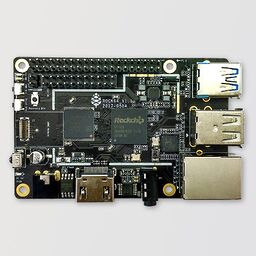NixOS on ARM/PINE64 ROCK64: Difference between revisions
imported>Mic92 No edit summary |
imported>Mic92 No edit summary |
||
| Line 33: | Line 33: | ||
This bootloader is not entirely open, incorporating a binary blob for the tertiary program loader (TPL). | This bootloader is not entirely open, incorporating a binary blob for the tertiary program loader (TPL). | ||
If your have nix installed you can download the latest version with: | If your have nix installed you can download the latest version with (This command also works on different | ||
architectures since it can be downloaded from the binary cache): | |||
<syntaxHighlight lang=console> | <syntaxHighlight lang=console> | ||
$ nix- | $ nix-build '<nixpkgs>' -A ubootRock64 --argstr system aarch64-linux | ||
$ ls -la result | |||
.r--r--r-- 107k root 1 Jan 1970 idbloader.img | |||
.r--r--r-- 765k root 1 Jan 1970 u-boot.itb | |||
</syntaxHighlight> | </syntaxHighlight> | ||
== Board-specific installation notes == | == Board-specific installation notes == | ||
Revision as of 07:22, 3 September 2020
| PINE64 ROCK64 | |
|---|---|

| |
| Manufacturer | PINE64 (Pine Microsystems Inc.) |
| Architecture | AArch64 |
| Bootloader | Upstream U-Boot |
| Boot options | microSD, eMMC, SPI NOR Flash |
The ROCK64 is a single board computer built around the Rockchip RK3328 SoC.
There are three models of the board, with 1, 2 or 4 GB of RAM. It can boot from an microSD card or an eMMC. It also has a 128 Mbit SPI flash that can be used to store the bootloader.
Status
This board has upstream U-Boot and kernel support, although the mainline kernel may still be missing some features. NixOS can be installed using manual partitioning and nixos-install or by modifying the aarch64 installation image as described in the next section.
U-Boot for this board is packaged in nixpkgs, and Hydra builds can be found here:
https://hydra.nixos.org/job/nixpkgs/trunk/ubootRock64.aarch64-linux
This bootloader is not entirely open, incorporating a binary blob for the tertiary program loader (TPL). If your have nix installed you can download the latest version with (This command also works on different architectures since it can be downloaded from the binary cache):
$ nix-build '<nixpkgs>' -A ubootRock64 --argstr system aarch64-linux
$ ls -la result
.r--r--r-- 107k root 1 Jan 1970 idbloader.img
.r--r--r-- 765k root 1 Jan 1970 u-boot.itb
Board-specific installation notes
U-Boot needs to be copied to specific sectors on the microSD card, eMMC or image with dd. Download/build U-Boot for the board, and write idbloader.img and u-boot.itb.
Replace in the command below /dev/mmcblkX with the correct device to the sdcard i.e. /dev/mmcblk0. You can use the lsblk command to get a list of all devices:
dd if=idbloader.img of=/dev/mmcblkX conv=fsync,notrunc bs=512 seek=64
dd if=u-boot.itb of=/dev/mmcblkX conv=fsync,notrunc bs=512 seek=16384
This will make the first partition of the installation device unmountable and it can be deleted, but the space needs to be kept to not overwrite the bootloader with another filesystem.
idbloader.img file. If that version is used, simply disregard the second command above.Serial console
The ROCK64 uses a GPIO pinout compatible with the Raspberry Pi 2 and newer. This means that the following pins can be used to connect a serial adapter:
| Pi-2 Bus | |
|---|---|
| Pin | Function |
| 6 | GND |
| 8 | UART0_TX |
| 10 | UART0_RX |
The serial console runs at 1500000 baud in the bootloader. When using the standard NixOS aarch64 sd image, set console=ttyS2,115200n8 as kernel option in extlinux/extlinux.conf on the boot partition of the sdimage to get a serial linux console. For debugging, console=uart8250,mmio32,0xff130000 should give you an early UART console, before the full serial console is up.
Compatibility notes
| Mainline kernel | ayufan-rock64/linux-mainline-kernel | |
|---|---|---|
| Ethernet | Works | Works |
| USB | As of 5.4, USB 3.0 does not work | Works |
| HDMI | Works | Works |
Downstream kernel
To use all hardware functionality, it is currently necessary to use a downstream kernel:
- ayufan-rock64/linux-kernel 4.4 based on Rockchip BSP
- ayufan-rock64/linux-mainline-kernel mainline based, with potentially fewer hardware features supported. This kernel is not based on a kernel stable branch, so it may have more bugs (unrelated to the hardware).
ramdisk_addr_r in the U-Boot console, or using upstream U-Boot. 